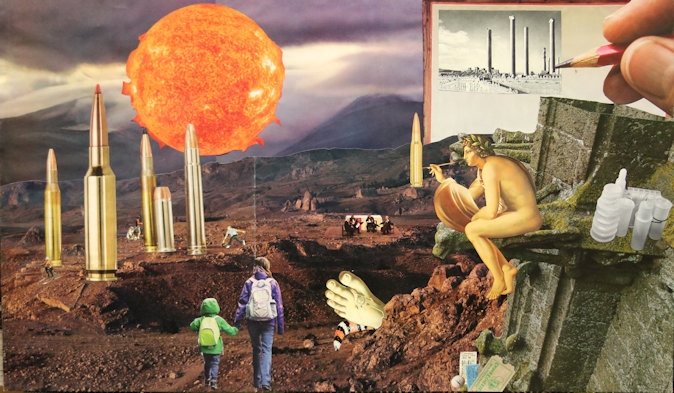 What would happen if one woman told the truth about her life? The world would split open – Muriel Rukeyser
What would happen if one woman told the truth about her life? The world would split open – Muriel Rukeyser
We learned English faster than our parents, their tongues too old to take a new shape. Our tongues still coated in milk, this meant we didn’t pray like they did, and God didn’t answer when we called. English teachers tskedtskedtsked when our words lost letters: when ending became endin became the end. English was a world we rebuilt with our small hands. I was a girl, small and dark skinned. Nothing belonged to me except what came out of this mouth of mine.
When my cousin put his _______ in my _______ or when my uncle _______ed me in the living room of my own home and the strange man grabbed my _______ last summer on the train I wanted to say stop but didn’t know what language to say it in.
In Somalia we speak Somali, in America we speak English, or sometimes we speak nothing at all. All the women I know speak in whispers. When I try and tell some stories language turns to iron, heavy and rusting in the back of my throat. I bite my tongue and taste blood.
Silence was my first language. I am fluent in its cadences. I know the way quiet can pour out of a mouth like a rush of water in a season of drought.
___
Jamila Osman is a Somali writer, educator, and organizer living in Portland, Oregon. She teaches high school English and facilitates poetry workshops for marginalized youth, including currently incarcerated and immigrant and refugee youth. Her writing explores the tension between place, history, and identity. Her work has previously appeared in Pacific Standard, Catapult, The Establishment, Boaat, Diagram, and other places.She is a VONA/Voices of Our Nation workshop alum.
Artwork by John Gallaher

15 comments
Amelia says:
May 16, 2018
Thank you for sharing your story. It was amazing. I especially loved the ending.
Nicole says:
May 18, 2018
Your words are powerful.
Jan Priddy says:
May 19, 2018
Honor to a sister-teacher, and a poet.
Elizabeth Maria Naranjo says:
May 19, 2018
This essay is perfection. Thank you for sharing it.
Rebecca Friou says:
May 25, 2018
Wow. So powerful. Thank you for sharing!
daisy hernandez says:
May 30, 2018
Your writing is stunning.
Sejal A. Shah says:
Jul 21, 2018
Gripping. And I agree with daisy—just stunning.
Jerry Shao says:
Sep 18, 2018
Your idea and writing are stunning, and your metaphors are nice.
Julia Joyce says:
Sep 18, 2018
In the era of #MeToo, this is one of the first pieces of writing I have encountered that truly captures the experience of silence in the frame of assault. Truly in the spirit of “giving voice to the voiceless,” you provide not only a deep insight to your own experience, but offer comfort and care for those who have not be able to find their story. Furthermore, your ability to describe the lived and profound experience of the way language can “other” certain groups of people is outstanding. I loved this piece.
Dan Alling says:
Sep 19, 2018
The line “Silence is my first language. I am fluent in its cadences.” struck me because it suggests that you understand silence beyond simply not speaking; silence is like another language in and of itself. We speak silence as we would English or Somali and it carries the same weight and power as any other language. Thank you for the strong piece and sharing this with us.
Yuan Wang says:
Sep 19, 2018
I like the sentence that ‘Nothing belonged to me except what came out of this mouth of mine’. It is a powerful statement that indicates the importance of speaking. Speaking is not only a way to communicate, but it also can express emotions and ideas. Thank you for sharing this piece.
Huda Navaid says:
Sep 19, 2018
As an immigrant from a Muslim country myself, I can tell you: this piece is absolutely stunning! I felt it truly hit my heart and resonate deeply with me. The ending is phenomenal. Just that one sentence: “silence was my first language” is so packed with meaning. Thank you for taking the time to write such a beautiful, meaningful piece! Reading it truly made my day.
Cynthia Inman Graham says:
Jan 21, 2020
I was just introduced to your essay at a workshop run by Tom McAlister. As a retired ESL teacher I found it perfect. I had tears in my eyes. I will print out copies for my memoir group.
Privately Held says:
Apr 2, 2020
Beautiful and moving writing. Painful I’m sure but brilliant. Cheers!!!
Hanna says:
Sep 15, 2020
My first thought: powerful.
My girlfriends first thought: powerful.
These words are hurtful and raw and true and enlightening. Thank you.